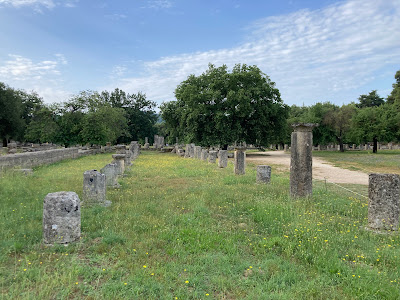"At the Olympic Games, it isn't the beautiful or strongest who is crowned, but those who compete" - Aristotle.
The names Olympia through its name sake the Olympic Games may be one of the most well known names in the world. Although mostly known for the Olympic Games (traditionally started in 776 B.C. and continuing every four years through at least 393 A.D.), it was also the site of a major religious site for Zeus (The Olympian Zeus was considered one of the Seven Wonders of the Ancient World).
(Below: The Palestra and Gymasion, training areas for athletes)
The Olympic Games - much like the Pythian Games at Delphi we saw earlier - were connected with religious worship. The games themselves were held every four years (a time period known as an Olympiad) and during the Games, a truce throughout Greece was called; athletes and spectators could travel under truce. To break the truce was to invoke the wrath of the Gods.
The Olympic Games held something somewhat unique (at least to my mind) in that in order to compete, one had to be 1) A free male; and 2) Greek. That meant that Greeks from not only Greece but any of the Greeks kingdoms or colonies could compete as equals. This built a powerful sense among the various Greek cities and colonies that they was something about them that related them to one another, even thought apart. It served to build a sense of the Greek identity.
(Ruins of the Philleppeion, built by Philip II to honor himself and his family)
When the games were not in session, this was an uninhabited location. When the games were going, there were no accommodations made: People just put up tents and attended.
(Another random stone with Greek on it. The fact that one can still make out what is a living language thousands of years later astounds me.)
The base of this pillar (more visible in the second picture) notes that it was raised by King Ptolemy (of the Ptolemaid dynasty of Egypt).
















That patch of ground saw a lot of sweat and effort over a millennium, nice selection of photos TB.
ReplyDeleteIt did indeed, Nylon12 - and of course you are welcome.
DeleteInteresting little history lesson. It must have been glorious in its day.
ReplyDeleteLeigh, one of the fascinating things to me is that there was much more to the Games than just the competition aspect. In some ways, it was considered an act of worship.
DeleteSee these places in ruins does make one long to see what they would have looked like in all their glory.